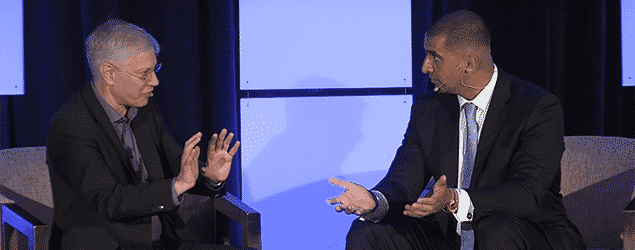Anniversary Chapters: Gregory Salmieri Discusses “Discovering Atlantis: Atlas Shrugged’s Demonstration of a New Moral Philosophy”

“In my chapter title, ‘Discovering Atlantis’ refers to a scene where Hank Rearden says he feels like he’s discovering a new continent, and there are some allusions that connect this to the Atlantis image that’s present elsewhere in the novel,” says Gregory Salmieri, talking about his essay “Discovering Atlantis: Atlas Shrugged’s Demonstration of a New Moral Philosophy.” It’s one chapter among many in Robert Mayhew’s Essays on Ayn Rand’s “Atlas Shrugged,” whose various authors we’re interviewing to celebrate the 60th publication anniversary of Rand’s magnum opus.
“What he and Dagny Taggart are discovering is really a whole philosophy,” Salmieri observes. “That’s what the plot of the novel turns on, their learning a new philosophy in steps. Reflecting on the earlier events leads them to challenge certain premises or grasp a new principle — and then, having learned this and put it into action, they make new observations which lead to further discoveries, culminating in a philosophic system that’s presented in the long speech in part III of the novel.
“I heard Harry Binswanger say once that every line in that speech is concretized by an event in the novel, and that’s true. But some time in the early 2000s I realized that the earlier events didn’t just concretize the principles. Instead, the principles were induced in stages from the concretes, in something like the way Leonard Peikoff discusses in his lectures on Objectivism Through Induction.
“Hearing those lectures made me see the novels in a new light. I wrote an essay in 2004 in Robert’s collection on Anthem [Essays on Ayn Rand’s “Anthem”] tracing all the steps of the induction in that novel, and a few years later, I thought I was ready to trace the much more complex chain of reasoning in Atlas Shrugged. That’s what I did in my 2007 Objectivist Summer Conference course on Atlas Shrugged as a Work of Philosophy. What’s in Robert’s book is a more developed version of that material.”
Salmieri teaches philosophy at Rutgers University and is a philosophy fellow at the Anthem Foundation. He is co-editor (with Allan Gotthelf) of A Companion to Ayn Rand, and he and ARI fellow Ben Bayer are currently leading The Atlas Project, an eight-month long weekly discussion of Atlas Shrugged taking place on Facebook.
Here’s an excerpt from Salmieri’s essay:
In reading Atlas Shrugged we can ourselves follow the same complex process of reasoning and rethinking as do its heroes, moving from concretes to progressively broader, deeper, and more tightly integrated philosophical principles, which make it possible to understand that much of the pain, boredom, and despair felt by so many people is unnecessary and to achieve the “radiant state of existence” epitomized by Galt.
If you’re intrigued by these perspectives, Essays on Ayn Rand’s “Atlas Shrugged” is available here, and more on Atlas Shrugged is available here. Also, be sure to read the previous blog post in which Salmieri discusses the other essay he contributed to the Mayhew volume, “Atlas Shrugged on the Role of the Mind in Man’s Existence.”



